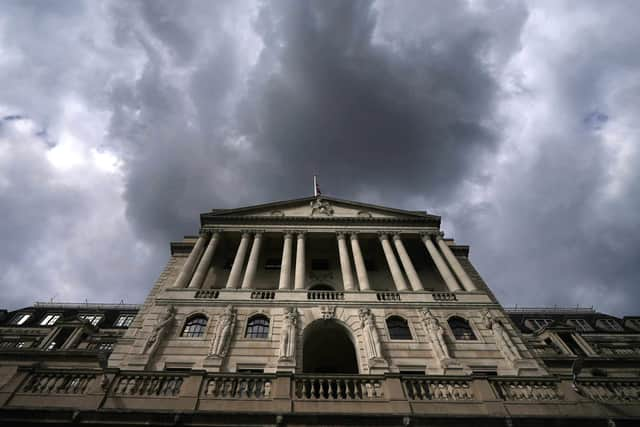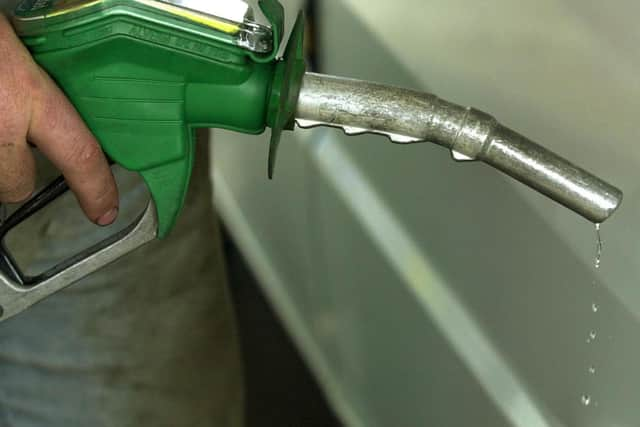Interest rate hike hangs in balance after surprise cooling in inflation
The market had been pricing in a 90 per cent chance of a further quarter-point increase in the bank base rate, taking it to 5.5 per cent, but following news of a fresh dip in the annual rate of inflation that likelihood was slashed to closer to 50 per cent.
The latest data from the Office for National Statistics (ONS) showed that the annual measure of consumer price inflation eased to 6.7 per cent in August, from 6.8 per cent in July, confounding most economists’ expectations for a rebound to just over 7 per cent on the back of rising oil prices and a shake-up of alcohol duties at the start of last month. The lower August reading means that inflation has cooled for the third month in a row and now stands well below last autumn’s peak of 11.1 per cent, which sparked union unrest and demands for higher wages.
Advertisement
Hide AdAdvertisement
Hide AdThe ONS noted that prices for milk, cheese, eggs and vegetables all fell last month, causing a deflationary effect, while the price of bread and cereals rose. Most observers had expected inflation to pick up due to a rise in the cost of petrol and diesel last month, driven by higher oil prices. Those increases have continued into September and could yet cause a blip when this month’s inflation rate is published in October. A drop in air fares and accommodation costs also helped drive the August inflation rate lower.


The Institute of Directors (IoD) argued that the lower-than-expected inflation figure supported the case to hold interest rates at 5.25 per cent. The business organisation’s chief economist, Kitty Ussher, said: “This slight fall in the headline rate of inflation is better than was expected given the increased cost of petrol in August which had led many to think it would be higher in the short-term before the expected big drop in October. In fact, although there was strong upward pressure from petrol prices, this was offset by falls in many categories of food, as well as in restaurants, hotels and air fares. It is particularly encouraging to see lower core inflation and services inflation, both of which have been stubbornly high in recent months.
“Overall this supports our narrative that the interest rate rises we have seen so far are doing their job and should be given more time to work before the Bank of England considers whether the base rate needs to rise further.”
At 6.7 per cent, the UK’s inflation rate still remains high compared to other major economies, including the US where it is currently less than 4 per cent. The Organisation for Economic Co-operation and Development (OECD) forecast this week that the UK economy is set to witness the highest inflation rate of any G7 advanced economy. It expects UK inflation to be 7.2 per cent in 2023, which would be the fastest rate across the G7 and the third fastest across the G20. Prime Minister Rishi Sunak has made halving inflation this year - down to a level just above 5 per cent - one of his key policy priorities. That still puts it at more than twice the Bank of England’s 2 per cent target.
Daniel Casali, chief investment strategist at wealth management firm Evelyn Partners, said: “Surveys of inflation expectations have come down from peaks. The YouGov household survey of one-year UK inflation expectations is currently 4.4 per cent, compared to a peak of 6.3 per cent in August 2022. This suggests that the risk of inflation becoming entrenched in the economy is contained and should reduce pressure on the Bank of England to raise interest rates significantly from here. As it stands, money markets have priced one more 0.25 percentage point rate hike when the monetary policy committee meets [today] and then a pause from there.”


According to the ONS report, core inflation, which strips out the more volatile components such as food, energy, alcohol and tobacco, fell markedly to 6.2 per cent in August from 6.9 per cent the month before. The post-pandemic surge in inflation has been underpinned by global factors such as the conflict in Ukraine, energy costs and global supply chain bottlenecks - areas outside the control of the UK central bank.
Sam Miley, managing economist at the Centre for Economics and Business Research (CEBR) said an inflationary slowdown was unlikely to deter the Bank of England from further monetary tightening. “With both headline and core inflation remaining more than three times target, there is some way to go before the monetary policy committee will start to loosen its policy stance,” he noted. “Further increases in the oil price might slow down the fall in inflation and keep prices growth higher for longer.”
Rachel Winter, a partner at investment house Killik & Co, added: “The latest inflation figures from the ONS will further encourage investors who have been buoyed by a sense that markets are signalling a return to normalcy. Steadier prices will allow both companies and investors to adopt longer-term strategies which should strengthen confidence and markets in the coming months. Options are plentiful for investors at the moment, with a host of attractive options on the table.”
Comments
Want to join the conversation? Please or to comment on this article.